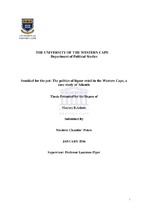| dc.contributor.advisor | Piper, Laurence | |
| dc.contributor.author | Peters, Nicolette Chandre’ | |
| dc.date.accessioned | 2016-05-19T10:44:21Z | |
| dc.date.available | 2016-05-19T10:44:21Z | |
| dc.date.issued | 2016 | |
| dc.identifier.uri | http://hdl.handle.net/11394/4968 | |
| dc.description | Magister Administrationis - MAdmin | en_US |
| dc.description.abstract | The Western Cape Liquor Act of 2008 was implemented to decrease the amount of shebeens operating in South Africa’s residential areas. This action was taken in order to reduce liquor harm which has been widely reported on by health professionals. However shebeens serve as a livelihood source for poor South Africans. Thus a possible tension could exist since shebeen owners and communities might become disgruntled with politicians, political parties and government for implementing a law which threatens livelihoods. This thesis paper examines the political perceptions of the people of Atlantis towards political parties in light of the implementation of the Western Cape Liquor Act of 2008. Qualitative semi-structured interviews were conducted with key role players residing in
Atlantis, and focus groups were also held with shebeen owners. This was done in order to determine the community’s attitude towards shebeens, liquor, politicians, political parties, government and the Liquor Act. Respondents reported that the community remains underdeveloped and that their views are ignored by politicians and other public officials. Shebeens are viewed as a necessary evil since there is a stigma attached to selling liquor and many respondents believe that liquor abuse is the cause of many socio economic problems facing Atlantis. However there are no other viable job opportunities in the area forcing shebeen proprietors and the community to accept shebeens. Interestingly this thesis also shows that both the key role players and shebeen owners have a similar attitude towards shebeens and politicians; as both groups have adopted an ambivalent attitude towards shebeens and politicians. Bayat (2000) Chatterjee’s (2004) writings will be used to show that informality has become the only viable option in Atlantis. This is because the state has not been able to provide alternative employment in the area. The residents therefore now break the law in order to survive. Moreover politics and politicians are disliked but residents still partake in politics .There is therefore an ambivalence towards both politics and shebeens in the area. In conclusion the people of Atlantis feel marginalized and oppressed by those who wield political power. The Western Cape Liquor Act however, has not had a dramatic impact as will be shown when comparing Bayat’s (2000) quiet encroachment of the ordinary theory to the case. | en_US |
| dc.language.iso | en | en_US |
| dc.publisher | University of the Western Cape | en_US |
| dc.subject | Shebeens | en_US |
| dc.subject | Smokkel huis | en_US |
| dc.subject | Informal sector | en_US |
| dc.subject | Western Cape Liquor Act of 2008 | en_US |
| dc.subject | Politics | en_US |
| dc.title | Smokkel for the pot : the politics of liquor retail in the Western Cape, a case study of Atlantis | en_US |
| dc.type | Thesis | en_US |
| dc.rights.holder | University of the Western Cape | en_US |

